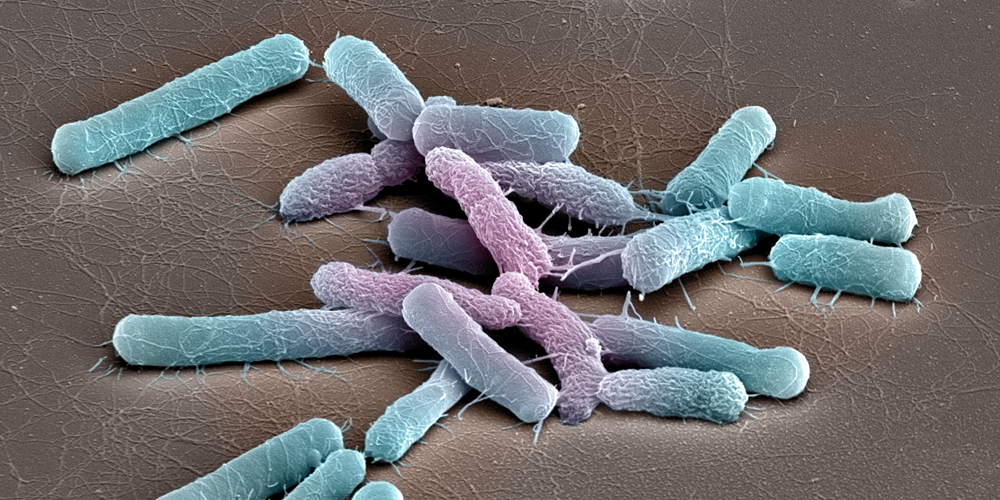Antibiotics are still the treatment of choice in fighting bacterial infections. However, due to their extensive and sometimes improper use in medicine and livestock farming, resistant pathogens are increasingly emerging, which no longer respond to antibiotic treatment. Vaccination is an efficient strategy to prevent both the transmission of pathogens and the development of antibiotic resistance, but variants often emerge that escape the effects of vaccination.
Researchers led by Prof. Médéric Diard from the Biozentrum and Prof. Wolf-Dietrich Hardt and Prof. Emma Slack from ETH Zurich have now developed an evolution-proof vaccine to combat the gut pathogen Salmonella Typhimurium. This oral vaccine, as they reported in “Nature Microbiology”, stimulates the production of a cocktail of specific antibodies in the gut which drives Salmonella into an evolutionary trap. The selective pressure created by these antibodies directs the evolution of the bacteria in such a way that only less harmful variants evolve.
Vaccine sets an evolutionary trap for Salmonella
With their vaccination strategy, the scientists developed a novel approach to fight pathogens. “We are trying to work with evolution, not against it,” explains Diard. “Microbes have tremendous adaptation skills. They can change rapidly to cope with unfavorable living conditions. However, bacteria cannot foresee the long-term detrimental consequences of this adaptation. Our vaccine exploits this weakness.”
Salmonella Typhimurium can colonize the intestine of broad range of animal hosts. It is one of the most common causes of diarrhea in humans. The main cause of a Salmonella infection is contaminated food and water. The pathogen evades the immune defense of the gut by quickly modifying the composition of its cell surface molecules. The immune system struggles to keep up with this bacterial adaptation and cannot produce the antibodies needed to recognize these surface structures fast enough to be able to neutralize the bacteria.
Vaccine cocktail favors less harmful variants of Salmonella
“We have vaccinated mice to stimulate the production of specific IgA antibodies against the O antigen, the immuno-dominant surface molecule,” says Diard. “We then characterized in detail the O antigen Salmonella variants that escaped the vaccination. We repeated this process and made a vaccine triggering the production of IgA recognizing all variations of the O antigen. Salmonella kept evolving, this time by completely losing the O antigen.” However, there is a catch, for without O antigen, Salmonella is highly vulnerable to stress and attacks by predators like bacteriophages. Their virulence is reduced, and their transmission is impaired.
In experiments using mice as model, the scientists were also able to show that their new vaccine prevents Salmonellosis more effectively than existing vaccines approved for use in pigs and chickens. Based on this concept, they are developing vaccines against other bacteria like multi-drug resistant pathogens. This approach could also be applied in biotechnology to specifically modify microorganisms through vaccine-generated selective pressure.
Original article:
Médéric Diard, Erik Bakkeren, Verena Lentsch, Andrea Rocker, Nahimi Amare Bekele, Daniel Hoces, Selma Aslani, Markus Arnoldini, Flurina Böhi, Kathrin Schumann-Moor, Jozef Adamcik, Luca Piccoli, Antonio Lanzavecchia, Beth M. Stadtmueller, Nicholas Donohue, Marjan W. van der Woude, Alyson Hockenberry, Patrick H. Viollier, Laurent Falquet, Daniel Wüthrich, Ferdinando Bonfiglio, Claude Loverdo, Adrian Egli, Giorgia Zandomeneghi, Raffaele Mezzenga, Otto Holst, Beat H. Meier, Wolf-Dietrich Hardt and Emma Slack. A rationally designed oral vaccine induces immunoglobulin A in the murine gut that directs the evolution of attenuated Salmonella variants. Nature Microbiology, published online 27 May 2021
Contact: Communications



